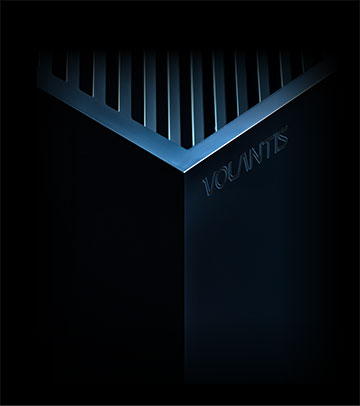
Volantis photonic computing box. [Image: Volantis]
The California-based semiconductor startup Volantis emerged from stealth mode and announced a US$9 million seed round of funding. The company, which develops photonically integrated computers for AI applications, aims to “to scale a new class of photonic compute architecture that moves beyond the limitations of silicon photonics.”
Directly modulated and on-chip
The considerable bandwidth and power required to move data among chips remains a key bottleneck in AI computing. “While photonics has long been seen as the answer, silicon photonics—the dominant approach for the past two decades—has consistently failed to scale inside systems,” claims Volantis in a press release.
The company says that its approach is “fundamentally different” to previous architectures, instead leveraging direct laser modulation and wafer-scale integration. It has integrated directly modulated vertical cavity surface-emitting lasers (VCSELs) with on-chip, densely parallel optical waveguides, which it says should enable many low-powered links to work simultaneously and deliver high aggregate bandwidth, similar to the way that GPUs speed computation. In the last two years, Volantis has built working, patent-pending prototype systems using this combination, according to the company.
Volantis claims that it can provide a 15-fold improvement in performance per dollar, while also increasing stability and decreasing power consumption. The company’s website adds that it has “eliminated the need for fiber altogether, with 10× the wire density and 10× the inference of today’s market-leading chips.”
“This architecture packs the power of a server rack into a chip-scale package, reducing energy consumption and cost while dramatically increasing compute speed,” the press release notes.
High-profile support
Since its founding in 2022 by CEO Tapa Ghosh and CTO Roy Meade, Volantis has attracted the financial support of notable backers, including OpenAI’s Sam Altman. The current round of funding includes backing from Alex Wang of Scale AI and Trevor Blackwell of Y Combinator. The company says it plans to use the cash infusion to continue refining the chip architecture, grow its engineering team and begin early customer engagements. The company website notes that pre-orders for its photonic motherboards will begin in the first quarter of 2026.
Looking ahead, Volantis advisor Clint Schow, University of California, Santa Barbara, USA, added, “This new approach takes proven, low-cost VCSEL technology and unleashes it at scale to deliver a wafer-scale AI processor. Volantis is not trying to retrofit today’s chips; they’re building what the next decade of compute will require.”

